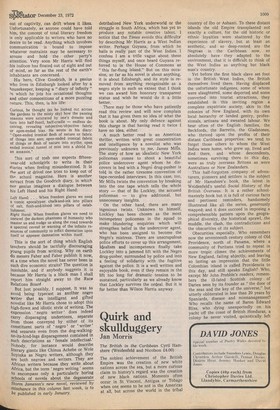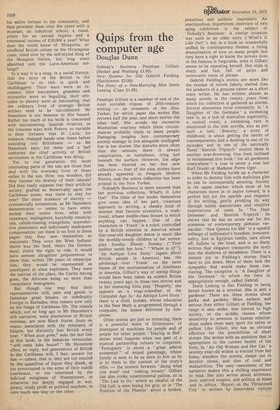Quirk and skullduggery
Jan Morris
The British in the Caribbean Cyril Hamshere (Weidenfeld and Nicolson £4.00) The noblest achievement of the British Empire was the creation of new white nations across the sea, but a more curious claim to history's regard was the creation of new black nations. Moments often occur in St Vincent, Antigua or Tobago when one seems to be not in the Americas at all, but across the world in the tribal country of lbo or Ashanti. To these distant islands the old Empire transplanted not
exactly a culture, for the old historic or ethnic loyalties were shattered by the experience of slavery, but at least an aesthetic, and so deep-rooted are the Negroes in the Caribbean now, so absolutely have they adapted to the environment, that it is difficult to think of the West Indies as anything but black man's country.
Yet before the first black slave set foot in the British West Indies, the British themselves lived there. Having displaced the unfortunate indigenes, some of whom were slaughtered, some deported and some converted into tourist attractions, they established in this inviting region a complete expatriate society, akin to the colonies of New England, with its own local heirarchy or landed gentry, professionals, artisans and sweated labour. We hear often of the English families, the Beckfords, the Barretts, the Gladstones, who thrived upon the profits of their distant Caribbean properties: we .tend to forget those others to whom the West Indies were home, who grew up, lived and died there, and whose descendents, sometimes surviving there to this day, were as truly overseas Britons as were Australians or New Zealanders.
This half-forgotten company of adventurers, pioneers and settlers is the subject of Mr Hamshere's book, the latest in Weiclenfeld's useful Social History of the British Overseas, It is a rather schoolmasterly book but it is full of curious facts and pertinent reminders, handsomely illustrated like all the series, generously mapped; and it does succeed in imposing a comprehensible pattern upon the geographical diversity, the historical sprawl, the muddle, the clash, the contradictions and the obscurities of its subject.
Obscurities especially. Who remembers now the seventeenth century colony of Old. Providence, north of Panama, where a community of Puritans tried to repeat in . more tropic climes the achievements of New England, failing abjectly, and leaving so lasting an impression that the little Colombian island is called Providencia to this day, and still speaks English? Who, except Mr John Prebble's readers, remembers the ill-fated Scottish colony of Darien seen by its founder as "the door of the seas and the key of the universe," but utterly obliterated in less than 20 years by Spaniards, disease and mismanagement? Who recalls the name of Baron Edward Bliss, who dying unexpectedly on his yacht off the coast of British Honduras, a colony he never visited, quixotically left his entire fortune to the community, and thus provided them over the years with a museum, an industrial school, a canal, prizes for an annual regatta and a communal income of £10,000 a year? What does the world know of Mosquitia, ari unofficial British colony on the Nicaraguan coast, ruled over by the self-styled King of the Mosquito Nation, but long since absorbed Into the Latin-American melange?
In a way it is a snag, in a social history, that the story of the British in the Caribbean is so rich in quirk and skullduggery. Their wars were so incessant, their buccaneers, grandees and eccentrics were so beguiling, their attitudes to slavery were so fascinating, that the ordinary lives of 'average British settlers tend to be out-coloured. Mr Hamshere is not immune to this hazard. Rather too much of his book is concerned with buccaneering, Spanish rivalries, or the tiresome wars with France, so variable in their fortunes that St Lucia, for instance, changed hands nine times before subsiding into Britishness — as Mr Hamshere says, for three and a half centuries the chief activity of British servicemen in the Caribbean was dying.
Yet to our generation the most interesting parts of the tale are those that deal with the everyday lives of those exiles in the sun. How, one wonders, did they foresee the destiny of their islands? Did they really suppose that their artificial society, grafted so theatrically upon the Caribbean scene, was there to stay for ever? The sheer nuisance of slavery — economically nonsensical, as Mr Hamshere demonstrates — seems to have entramelled their entire lives, what with runaways, malingerers, busybody emancipists, rabble-rousing evangelists, unproductive pensioners and ludicrously inadequate compensation: yet there is no hint in these pages that they saw themselves as transients. They were the West Indians: theirs was the land, theirs the Governtnent, theirs the right to rule. It would have seemed altogether preposterous to them that, within 150 years of emancipation, they would be represented as interlopers or alien exploiters. They were the natives of the place, the Caribs having gone, the Africans being no more than compulsory immigrants.
But though one may find their representatives still, pale and gentle in Jamaican great houses, or indefinably foreign in Barbados, they remain now only on the fringe of Caribbean life. The islands which, not so long ago in Mr Hamshere's rich narrative, were plantations of Britain overseas, are now Black States, faute de mieux associated with the remnants of Empire, but distinctly less British every year. "When puss gone," asks the last line of this book, in the Jamaican vernacular, "will ratta take house?" Mr Hamshere offers no reply, but generations of British in the Caribbean will, I fear, answer for him — unless, that is, they are too sozzled by the quantities of liquor they drank, or too preoccupied in the arms of their nubile courtesans, or too infuriated by the habitual minginess of Westminster, or otherwise too deeply engaged in war, piracy, shady profit or political mayhem, to care much one way or the other.











































 Previous page
Previous page